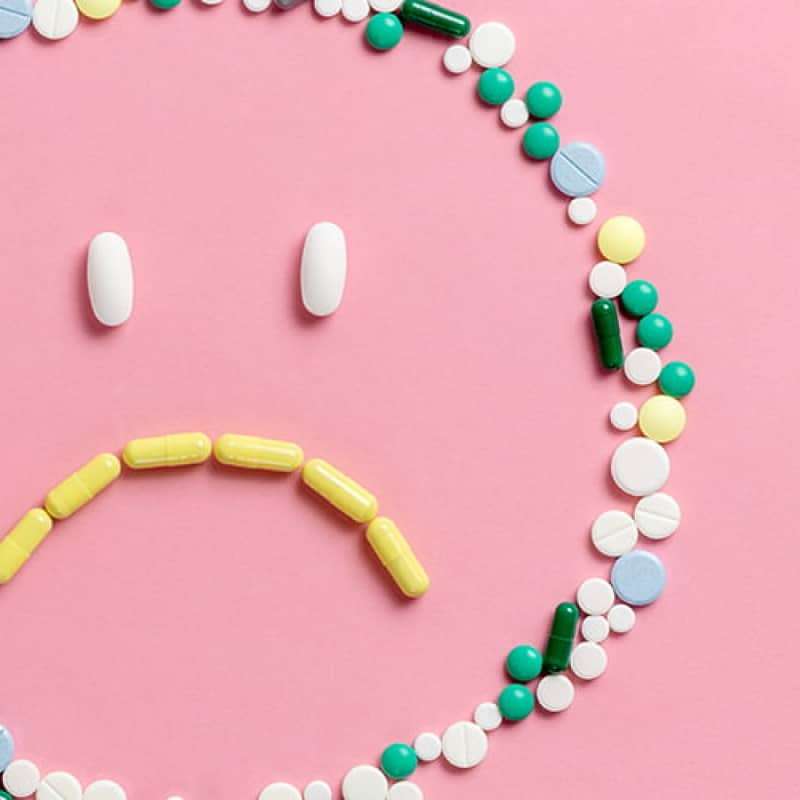
What is the Pill?
The pill (also known as the combined pill, the mini-pill or progesterone pill) helps women manage their periods as well as preventing pregnancy. When used correctly, there is less than a 1% chance you will fall pregnant when on the pill. From the pills discovery in the 1960s, it has revolutionised contraception, and has given rise to many different types and brands (some examples are Cerelle, Rigividon and Yasmin).
Although the pill is one of the most effective and popular forms of contraception around the world, it can come with some possible side effects. Common side effects include inter-menstrual spotting, nausea, breast tenderness, headaches and weight gain. Another issue that a lot of women report is emotional and hormonal changes which can lead to feelings of irritability, low mood or even depression.
How Does the Pill Work?
The pill works by preventing the ovaries from releasing an egg each month. It also makes it harder for sperm to penetrate the womb and can reduce the chances of pregnancy by over 99% when used correctly. The combined pill contains synthetic versions of the hormones estrogen and progesterone and is taken for 21 days with a 7 day break. The mini-pill contains progesterone only and is taken once a day without a break each month. For more information about choosing the right contraception for you check out our A-Z of contraception!

Does the Pill Affect Mood?
The reason why the pill can affect mood and emotions is not fully understood, but many believe that the hormones within the pill (in particular progesterone) can affect brain function, as Progesterone has been proven to play a significant role in cognitive and emotional functioning [1]. There is evidence to suggest the the pill can affect women’s abilities to read the emotions of others, and were approximately 10% worse than women who were not on the pill [2]. In fact a study on over 1 million women in Denmark showed a 50% increase in the risk of depression after being on contraception for 6 months [3].
At first glance this seems like a dangerously large percentage, but it is important to consider that although the risk is increased it does not mean that half a million women developed depression after using contraception. In fact out of 100 women who were using the pill, only 2.2 out of 100 would develop depression [4].
In fact a conflicting study showed that the pill actually reduced the rates of depression amongst women aged 25-34 [5]. This is important to mention, as younger women are much more likely to feel the emotional effects of hormonal contraception, and this study also used a much smaller sample size.
It’s also important to mention that:
- A link does not necessarily mean a cause
- There are many different types of contraception that affect every woman differently
- Contraception is an individual choice, no woman should feel forced or pressured to use hormonal contraception if they do not want to (though we would recommend using a condom to avoid any unintended pregnancies!)
It can be very easy to get lost in a sea of statistics and numbers when deciding whether or not the pill is for you, and sadly there is not conclusive evidence for either side of the argument. Mood is an incredibly subjective individual experience, making it hard for scientists to define and pin down. At the end of the day no one knows your mind and body better than you, that’s why we spoke to different women who have tried the contraceptive pill to get their stories and learn how they deal with the emotional effects the pill can have.
What You Have to Say…
“I decided to go on the pill when I was about 15, mostly to manage my periods. I started on the combined pill and stayed on it for a few years, at the time I didn’t realise I had another option! As I hit my late teens I started to find the side effects of the combined pill becoming harder to manage, the low mood and irritability that I felt was starting to take over my life. I visited my GP and swapped to the progesterone only pill, and within a few months my mood was back to normal and I felt great! My tip would be don’t give up if one pill doesn’t work, there are so many options you will be able to find the right one for you!’
Lily, 23.
‘I was prescribed the pill to help with my Acne, and the first few months I did notice a slight change in my mood. After that, I felt fine and back to normal, and as my Acne started to clear, I felt even better! I would recommend spending time with friends and family when you’re feeling down. Trust your gut, you know what’s best for your body’
Harriet, 32
‘I have been on the same pill since the 90’s, and never had any issues. But it’s not for everyone, do what works for you!’
Lesley, 57
“I first tried the progesterone only pill and was on my period for TWO MONTHS! I decided to swap to the combined pill and we’ve been enjoying our lives together for around 6 years. You don’t know until you try it so give it a go and if you’re not happy you can try something else until you find the right one for you. It also massively reduced my period pain’
Erin, 22
Finding a Solution
Here are some of our tips on managing the emotional side effects of the pill:
- Try to stick with it for at least 3 months as it can take a while for your body to adjust to the change. You might find some temporary side effects but generally these disappear after a few months.
- If you have occasional feelings of low mood due to the pill, often taking care of yourself and your mental health is a good way to start. Speak to friends/family/your GP to find a solution for you, you can find additional information and support on managing low mood
- If you are feeling depressed book an appointment with your GP, don’t be afraid to ask for help.
- If the side effects are extreme or do not seem to be subsiding after the appropriate time, it would be worth trying a different form of contraception. Some women even report that different brands of the same pill affect them differently, there’s generally something that works for everyone!
- If you are finding hormonal contraception is worsening low mood or depression you could perhaps try non-hormonal forms of contraception such as the copper coil (also known as the IUD), or barrier methods such as a female condom or regular condom.
Luckily for the majority of 3.1 million women in the UK the pill is a safe and effective way to manage periods and prevent pregnancy [6]. And to make it even easier it is available to order online from e-Surgery with delivery straight to your door. You can also use our free Ask a Pharmacist service for any questions or queries you might have about our products or service.
If you have any stories or tips about how you manage the pill, we’d love to hear from you! You can send us a DM on Twitter or Instagram.
Sources
- Study examining the effect of progesterone on vasomotor systems and mood | PubMed
- Study on oral contraceptives impairing complex emotional recognition in health women |Frontiers
- Association of hormonal contraception with depression | JAMA Network
- Harvard health article: Can hormonal birth control trigger depression | Harvard Health Publishing
- Association of hormonal contraceptive use with reduced levels of depressive symptoms: a national study of sexually active women in the United States. | PubMed
- Guardian article: pill still most popular prescribed contraceptive in England | The Guardian
Further Reading
- Combined Pill | NHS
- The Progesterone-only pill | NHS
- Desogestrel | National Institute Of Health And Care Excellence
- Depression, Self-care | Mind









